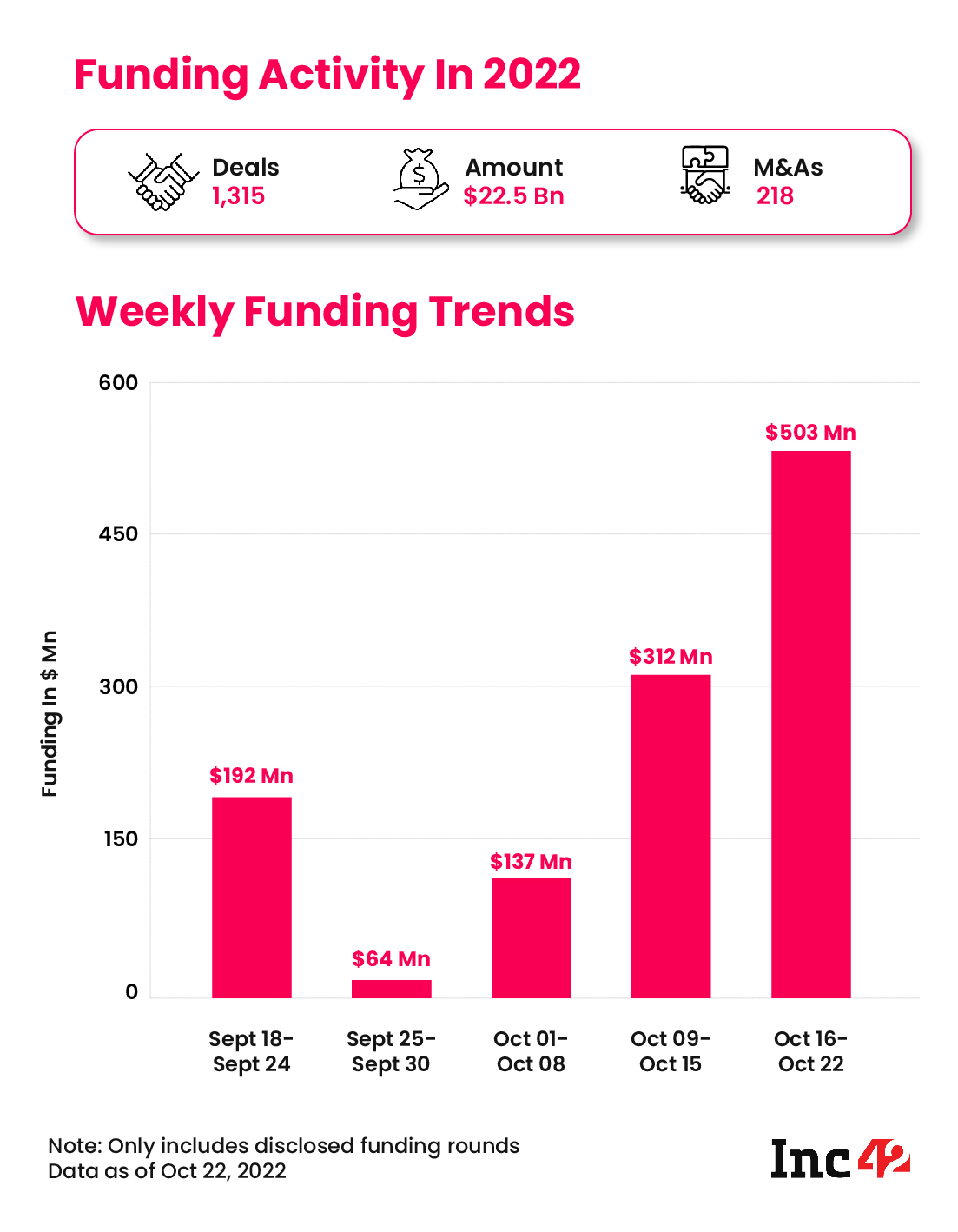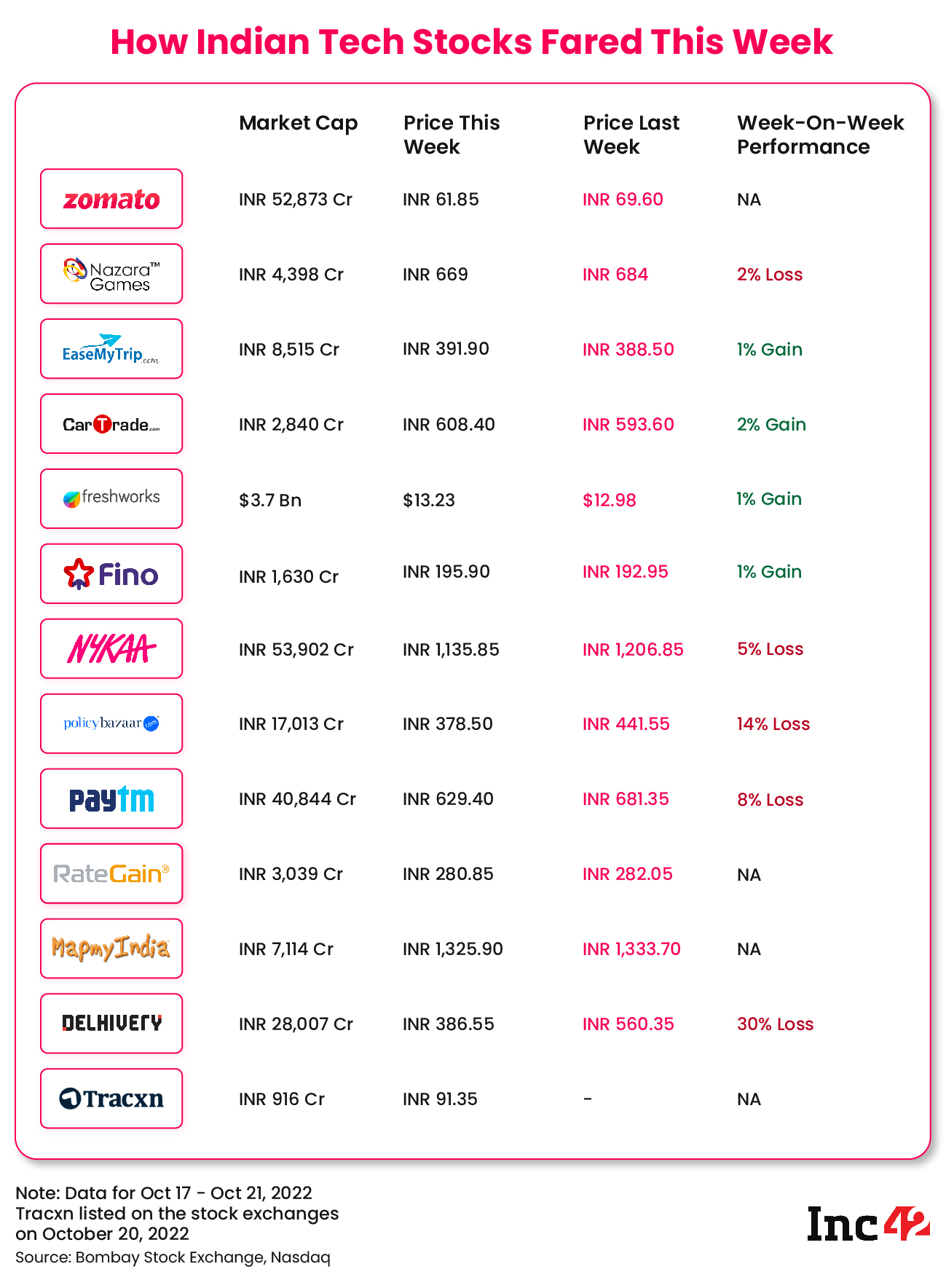It’s been three years since Diwali actually brought cheer to Indian startups. From Covid to the funding winter, startups have swung between highs and lows between 2020 and 2022.
A very happy Diwali to all our readers from Team Inc42!
We hope you have a tremendous end to this year. Celebrate with your loved ones and stay safe!
It’s been three years since Diwali actually brought cheer to Indian startups.
From Covid to the funding winter, startups have swung between highs and lows between 2020 and 2022.
Given the 15,000+ layoffs and half-a-dozen shutdowns, many startup founders are simply not in a position to cheer. It has been the sort of year where founders have admitted to spending sleepless nights, so perhaps this Diwali is meant for reflection rather than revelry.
Before we recap the year so far, here’s a short recap of this week’s top stories:
- Zoomcar’s Latest Gambit: Despite all its operational issues, revenue challenges and customer criticism over the past two years, Zoomcar is now on the verge of an IPO in the US. But will this save its India business?
- Drivezy Vs Yamaha: Drivezy has sued its investor Yamaha for stalling a $35 Mn acquisition deal and launching a parallel business using its proprietary data. Who will come out on top?
- Reliance In Q2: Jio saw a 26.9% year-on-year increase in net profit as mobile penetration improved, while Reliance Retail saw 53% growth in daily digital and new commerce orders
Dim Diwali For Startups
If the first half of the year was marred by major controversies at some high-profile startups, the slowdown in startup funding since June 2022 has overshadowed even that.
Now, the talk is about whether some of the startup valuations are justified, along with developments related to cutbacks, huge losses and downsizing via layoffs.
Controversies Galore
The controversies around BharatPe and its founder Ashneer Grover became the talk of startup town in the beginning of the year.
Then fellow Sequoia company Zilingo then found itself in the middle of major controversy, as CEO and cofounder Ankiti Bose dismissed.
Between these, another Sequoia startup Trell was hit by internal investigations for irregularities, while Infra.Market was hit by a tax probe.
Even as these controversies were grabbing the spotlight, a wave of layoffs had already begun. The decline in tech stocks in the very beginning of the year was the first signal and couple with the war-like economic conditions in Europe, the situatuon continued to turn grim through the first few months if the year.
Layoffs Take Centre Stage
Of course, with over 15,000 layoffs by now, the startup valuations came under pressure, investors were questioned over the merits of pouring in millions. All the expansion of the previous year came undone.
The edtech sector was the worst hit, even as most of the economy opened up. Unicorns such as BYJU’S, Unacademy, Vedantu have ended up on shaky grounds after what were supposed to be the best years for edtech.
The momentum of the past two years has come to a skidding halt. BYJU’S INR 4,600 Cr losses in FY21, followed by this week’s announcement of 2,500 employees being let go, just shows that the way forward is not yet clear.
We have also seen the most number of shutdowns in edtech this year. Lido, Crejo.Fun, Udayy, SuperLearn and Qin1 are the five startups that have shut shop this year.
It’s not just edtech; the RBI’s focus on more stringent regulations related to digital lending and BNPL-based models has also disrupted fintech high-flyers such as Slice, Uni Cards, Jupiter and others.
Coupled with revenue pressure given the existing zero MDR rules around UPI payments, fintech startups have more or less all turned their attention to the lending opportunity, which has created a host of loan apps without much differentiation.
IPOs On Hold
Besides layoffs, BYJU’S has also put its IPO plans on hold, something that we are likely to see happen more regularly in the next three or four months. While some startups have withdrawn their plans, many others are reported to be in the process of doing so.
The latest to take its IPO off the table is Droom, while the likes of OYO, boAt, Snapdeal, Pine Labs and PharmEasy have more or less deferred their plans to list on stock markets. Further, in the case of MobiKwik, the SEBI’s approval is set to expire later this month.
While last Diwali was all about Paytm’s mega IPO after Zomato’s high-profile listing, one year later, only two other tech companies have listed this year in Delhivery and Tracxn, this past week.
After a relatively good opening, Delhivery got a major jolt this past week. The ecommerce logistics tech company’s revenue projections have taken a hit because of macroeconomic and inflationary pressures.
As we wrote last week, the ecommerce festive sales have also lost much of their sheen in 2022. Now, Delhivery’s slow growth forecast is another indication that even online Diwali shopping has not been a major success this year. It is losing the appeal it once had.
Will Diwali 2023 Bring Cheer?
Of course, with relatively muted Diwalis in recent years with the exception of 2021’s record funding streak, the hope would be that 2023 would finally turn things around. But at the moment, the forecast does not look too great.
The fact that there’s little agreement on when the recovery might begin should clue us in on just how inclement the weather might be for the next 12 months.
While the startup funding and investor outlook is expected to improve by next year, it will not involve an immediate turnaround. Investors, who have slowed down the deal-making process, have $16 Bn in undeployed capital in reserves for when the tide turns.
In particular, funding for the large growth-stage and late-stage startups has slowed down, which has made Diwali seem bleaker this year. These are the startups that usually dominate the promotions on social media and on the ground, but this time around, the spending has been curtailed in many ways.
Consumer spending slowdown is evident if one looks at the ecommerce market, while expansion plans have been hurt by the looming war in Europe and the weakening of INR in comparison to USD.
As sustainable revenue models come back into fashion, perhaps the largesse of previous years might not return even by 2023.
Having said that, there’s always hope that the next year will finally enable Indian startups to have a bigger say in the global tech industry. Some of that can be attributed to the current attitude of startups towards sustainability in operations. This hope is what startups are banking on this Diwali.
Startup Funding, Tech Stocks & More
- Startup Funding This Week: Indian startups raised $503 Mn this week, but half of that came from BYJU’S $250 Mn round from existing investors

- Tracxn Off To A Flyer: Tracxn listed on the stock exchanges at a 4% premium and surged by 13% by the end of the second day of trading
- Nykaa’s Swing: Shares of Nykaa touched a record low of INR 1,130 this past week, a 56% decline from its record high INR 2,574 achieved last November. What a difference a year makes

- Focus On Agritech: The Indian government has announced that it would set up an INR 500 Cr startup accelerator for agritech startups along with a separate division within the government
- Save Now Buy Later? Fintech startup Multipl is taking India’s love for online shopping to help young users build a saving and investment habit
- Email On The Blockchain: Web3 startup hashmail is building a new inbox and reimagining email for the dApp generation. We took a look
That’s all for this Sunday. We’ll see you again with another roundup next week.
































 Ad-lite browsing experience
Ad-lite browsing experience